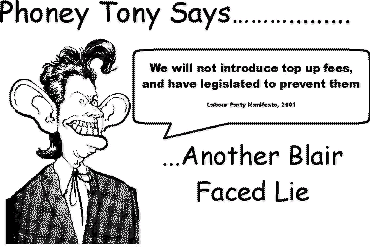![]()
THE GREAT EDUCATIONAL EXPANSION ![]()
A Response to Grant M. Nülle
Stephen Berry
![]() Grant
M. Nülle, a Research Fellow at the Council on Hemispheric Affairs in
Washington D.C. has recently written an article on higher education in the UK.
It was published by the Mises Institute and can be found at: http://www.mises.org/fullarticle.asp?control=1448&id=65
Grant
M. Nülle, a Research Fellow at the Council on Hemispheric Affairs in
Washington D.C. has recently written an article on higher education in the UK.
It was published by the Mises Institute and can be found at: http://www.mises.org/fullarticle.asp?control=1448&id=65
In this article, Nülle makes a
number of valid criticisms of present education policy in the UK, but fails to
make the principled case which one would hope for from one of the World Wide
Web’s leading libertarian sites.
Student Tuition Fees
Misled by the fact that the
government’s higher education bill passed the House of Commons by a mere 5
votes, Nülle writes,
"What is even more astounding
is how implacably opposed figures from all across the country's political
spectrum are to infusing market principles into the funding of England's
cramped, ageing and cash-strapped universities-especially at a time when most
of officialdom champions augmenting enrollment numbers-a task the higher
education bill only begins to address."
In fact, this bill is just the beginning of the process whereby students in the UK are going to have to pay much more towards the cost of their university education. Some of the measures, which may have been seen as half-hearted from across the Atlantic, were tailored purely to placate the dinosaurs on the left of the Labour Party and thereby ensure a majority for the bill. But make no mistake about it, higher tuition fees will become an increasing part of the higher education scene in the UK. Whatever the opposition parties say now for transient political gain, neither the Conservatives nor the Liberal Democrats will reverse the direction of these measures.

The progeny of the middle classes doth protest too much, methinks...
The UK is heading in the same
direction as United States, Canada, New Zealand and South Korea who fund
higher education by a mixture of taxation, private donations and sizable
contributions from students. The first steps may seem tentative, but the road
is clear.
State Spending on Education – Up or Down?
But what really bothers me is
the fact that Nülle seems to swallow the line of the educational
establishment in much of his article. At one point he even claims that
"state spending on higher education has declined markedly over the past
decade" when he means that state spending per student has
declined over the past decade. It's true there has been a large expansion of
the numbers in higher education over the last 15 years and funding per student
has not risen to match. But that does NOT constitute a fall in state spending
on higher education which unfortunately stands at an all time record in the
UK.
Nülle also seems to accept the
rationale behind the expansion of the last 15 years.
"At the same time, the
current Labour government aspires to enlarge the participation rate of
students aged 18 to 30 at university from the current 43% to 50% by the year
2010. By doing so, Mr. Blair and his party believe the United Kingdom can
close the GDP per capita gap that exists between it and economic high-flyers
Canada, Australia and the United States. The shortfall is thought to be
fostered by inferior productivity growth via workforce skill deficiencies"
I doubt that there is a
significant GDP per capita gap between Canada, Australia and the UK, but
assuredly it will not be closed by more spending more on university education.
The Swiss spend much less on higher education than the "economic
high-flyers Canada, Australia and the United States." but still manage
economically to fly even higher.
Does Nülle really think that "workforce skill deficiencies" will be solved by sending more people to university? At the moment in London, there is both a surplus of people who want to work in media studies and a shortage of plumbers. It's my contention that sending more people to university has helped to bring about, this skills shortage (or mismatch). The intention to send 50 per cent of 18-30 year olds to university will in fact devalue education and lead to the situation of countries like the India or the old Soviet Union where even the bus drivers had degrees.

Dr Gensberg has decided to become -- a gasfitter!
The mismatch does not stop at
the graduate level. The Daily Telegraph, 24th February 2004, has the
story of one Karl Gensberg, a PhD in molecular biology in Birmingham who grew
weary of struggling along as a lecturer on a low salary and fixed contracts.
He is now attending a training course to become a gas fitter, an occupation
where it’s possible to earn up to £50,000 a year. Such stories are
generally presented so as to provoke the reaction that the state is not paying
lecturers enough. In fact, they show that the whole direction of government
higher educational policy is wrong.
The Great Educational Expansion
The trouble is not that the
expansion over the last 15 years in the UK higher education sector was
underfunded. The real problem is that the expansion occurred at all. But here,
the UK is simply following the worldwide trend which asserts that more
schooling means more economic growth. Note that there is not even the most
perfunctory of nods to increasing the quality of education. The
doctrine simply states that increasing the number of students who go through
the higher education system will result in x per cent more economic growth.
Naturally, this is a doctrine which high spending governments find rather
congenial.
This idea seems to me to be
plain silly and lies at the root of the present higher education problems in
the UK – and elsewhere. For instance, the drop-out rate of students in
higher education has risen hand in hand with the great expansion, but when the
obvious economic waste of this was once pointed out by this writer, the
response was, ‘Ah, but the drop-out rate is far lower than in the US!
It’s no good allowing governments to set absurd targets and then
getting worked up about the extent to which the targets should be privately or
publicly financed. The idea that the government should set targets for
citizens and the citizens should then jump to attention should be something
which is deeply inimical to all believers in liberty.
State Bureaucrats?
This assumption sometimes leads
Nülle into positions which look distinctly odd.
"University staff is
declining in quantity and quality as those that are already employed or are
considering an academic career contend with meagre pay. Remuneration in
British higher education has risen only 5% since the early 1980s whereas the
rest of the UK economy has seen income rise by 45% over the same period.
Academics (dons) at Oxford are paid about a third as much per teaching hour as
in America, are bereft of teaching assistants and have only two support staff
at his or her disposal, compared to five per professor in America. Moreover,
the beginning salary for Oxford's dons is typically £14,100 ($26,000)"
Only two support staff at the
disposal of each academic. Whatever next? This paragraph is typical of the
easy ride that teachers and lecturers employed by the state get from many
libertarians. Would Nülle write so sympathetically about other members of the
state salariat – the much criticised ‘bureaucrats’, for instance?
To someone who regards much of
what goes on in higher education in the UK and elsewhere as a hindrance to
liberty and economic growth, it's reassuring that the best and the brightest
are choosing careers outside this sector. The fact that lecturers in the UK
may get paid one third less (or whatever the figure is) than those in the US
worries me as much as the fact that civil servants in the UK may get paid one
third less (or whatever the figure is) than those in the US. It’s probable
that we have far too many from both of these groups. Libertarians should make
clear that education is no different from other forms of economic activity.
It’s good when people voluntarily pay for it. When it is funded through
taxation, we do know whether it is under or oversupplied, let alone the
appropriate wage rate for its members.
The State and Education
Grant M. Nülle delicately tinkers around the edges of the subject of higher education. He seems to accept that the state can set a target and then concentrates on how this goal will be met and how much should be taxation v how much private contribution.

Tony slyly moves in the right
direction
What is needed in the UK in the
short term are both student tuition fees and the elimination of a
couple of hundred thousand-university places to quickly bring the system back
to an even keel.
What is wanted in the long term
is the questioning of the principle of ever more university education for ever
more people, funded by the taxpayer. Then we can question the principle of
sending children to school for longer and longer. Then we can question the
principle of state education. Then we can question the principle of compulsory
education. Then we can have our money back to spend on education - if that is
our sincere wish.
This would be an agenda, both
practical and principled, to gain support as the present state education
leviathan increasingly runs into problems across the Western World.
This article first appeared at
the new website of the THE LIBERAL ONLINE.
See http://theliberalonline.org/
![]()
Further reading:
"A withering critique of governmental and business attempts to support vocational education ... in the name of the nation's economic progress"– TES"
PDF version
of this page
![]()
tgee.pdf
Download
Requires Adobe
Acrobat Reader. This is
available
for free at
www.adobe.com
and on many free CDs.

The Alternative
Bookshop
Which specialises in,
but does not limit itself
to, books on Liberty
and Freedom ... Book
reviews, links,
bestsellers, rareties,
second— hand,
best price on books,
find rare books.

Laissez Faire
Books
The World's Largest
Selection of Books on
Liberty
|
|
|
|
|